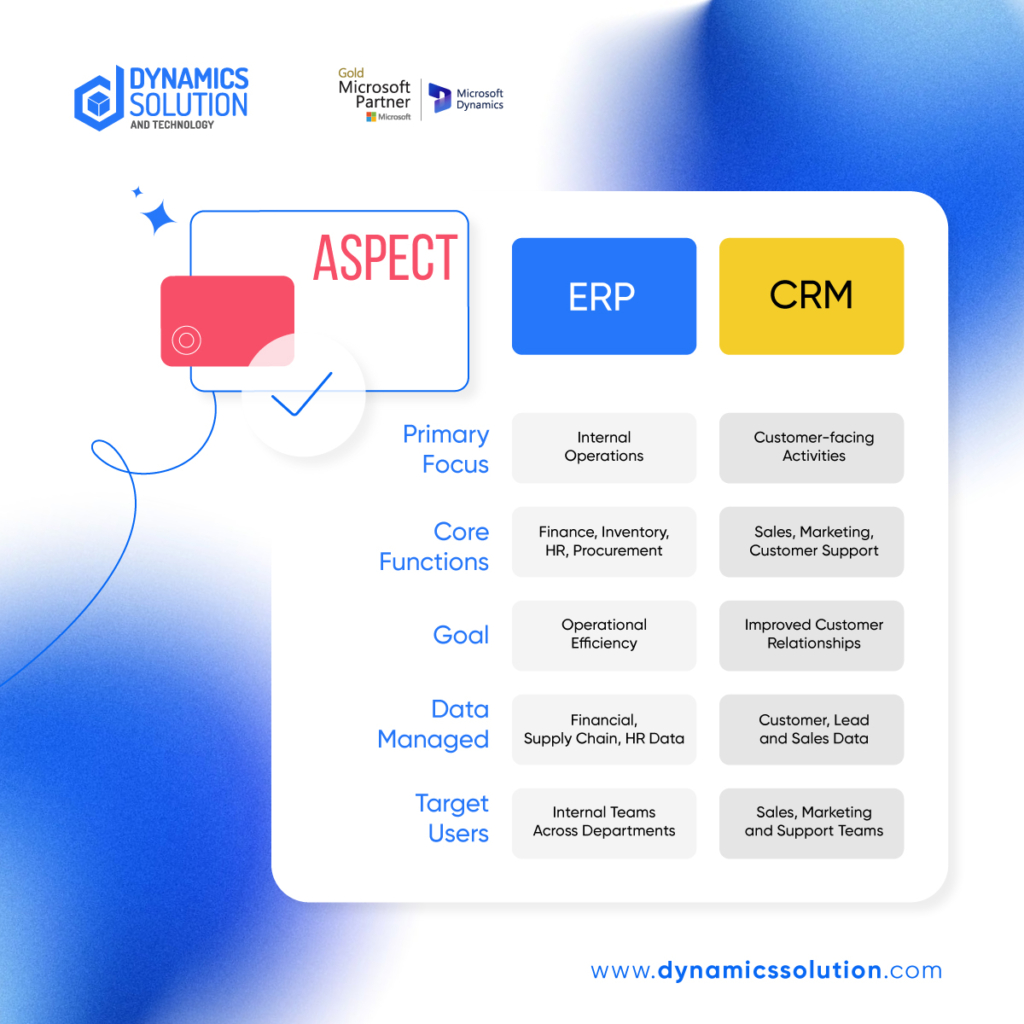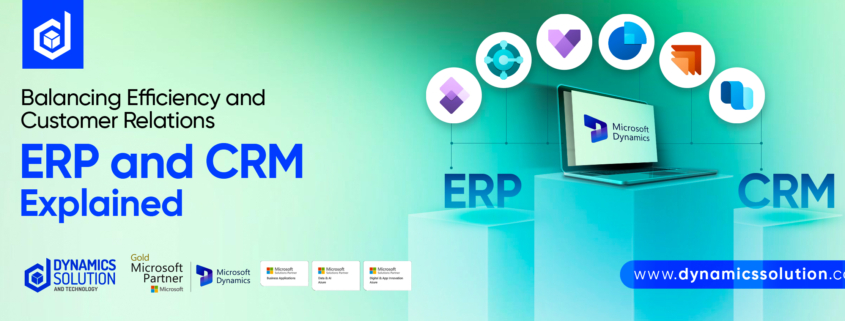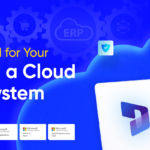Choosing the right software solution can make or break your organization’s success. One of the most common dilemmas businesses faces is whether to opt for an Enterprise Resource Planning (ERP) system, a Customer Relationship Management (CRM) system or both. Understanding the difference between these tools and how they align with your business needs is crucial for making the right decision.
This blog will delve into the functionalities of ERP and CRM systems, highlight their differences and guide you in choosing the best business solution for your organization’s goals. We’ll also explore how Microsoft Dynamics 365 integrates these systems to offer unparalleled value but first, let’s understand the basics.
What is ERP?
Enterprise Resource Planning (ERP) systems are designed to streamline and integrate an organization’s internal processes. From finance and supply chain management to human resources and procurement, ERP brings all core operations into a single unified platform.
Imagine a scenario where your inventory levels, sales data and production schedules are managed in silos. This often leads to inefficiencies, errors and delayed decision-making. ERP solves this by acting as a centralized hub for real-time data sharing, ensuring all departments are on the same page.
Key Features of ERP Systems:
- Finance and Accounting: Automates invoicing, payroll and financial reporting.
- Inventory Management: Tracks stock levels and optimizes supply chain operations.
- Procurement: Streamlines purchasing and vendor management.
- Human Resources: Manages employee records, payroll and benefits.
Benefits of ERP:
- Increased operational efficiency.
- Reduced manual effort through automation.
- Real-time insights into key performance indicators (KPIs).
- Scalability to accommodate business growth.
ERP Modernization with Dynamics 365
Microsoft Dynamics 365 ERP solutions, like Dynamics 365 Finance and Dynamics 365 Supply Chain Management, Dynamics 365 Human Resources and Dynamics 365 Business Central are designed to help businesses achieve these outcomes. With features like AI-driven insights and integration with the Power Platform, they make operational management seamless.
What is CRM?
Customer Relationship Management (CRM) systems, on the other hand, focus on external-facing operations, specifically those related to customers. CRM tools help businesses manage customer interactions, track sales pipelines and improve marketing efforts, all while keeping the customer at the center.
Consider a scenario where your sales team is unaware of a customer’s previous interactions with support. This gap can lead to lost sales opportunities and poor customer satisfaction. A CRM system ensures all customer data is centralized and accessible, enabling personalized and effective interactions.
Key Features of CRM Systems:
- Contact Management: Centralizes customer information like contact details and interaction history.
- Sales Management: Tracks leads, opportunities and deal progress.
- Marketing Automation: Creates targeted campaigns based on customer behavior.
- Customer Support: Manages service tickets and resolutions.
Benefits of CRM:
- Enhanced customer satisfaction and loyalty.
- Streamlined sales and marketing efforts.
- Data-driven decision-making for customer retention.
- Increased revenue through better sales strategies.
Dynamics 365 Customer Insights with Microsoft Copilot
Microsoft Dynamics 365 CRM, including Dynamics 365 Sales, Dynamics 365 Marketing, and Dynamics 365 Customer Service, offers robust features that empower businesses to build meaningful customer relationships. With AI tools like Dynamics 365 Copilot, you can also automate repetitive tasks and focus on strategic initiatives.
ERP vs CRM: Key Differences
At their core, ERP and CRM systems serve distinct purposes within an organization. The breakdown of their primary differences is illustrated below:

Both systems are essential for different aspects of a business but the choice often depends on current priorities and challenges.
When to Choose ERP?
ERP systems are ideal for businesses with complex internal operations that require efficiency and scalability. Here are some scenarios where ERP might be the better choice:
- Managing a Supply Chain: Businesses in manufacturing or retail often rely on ERP to optimize inventory, track production schedules and coordinate distribution.
- Improving Financial Oversight: Companies needing detailed financial reporting and compliance will benefit from ERP’s robust analytics.
- Streamlining Multi-Department Operations: If your organization struggles with disconnected systems and manual processes, ERP can centralize data and automate workflows.
With Dynamics 365 ERP solutions, businesses gain access to tools that reduce operational costs, minimize errors and provide real-time insights. For example, Dynamics 365 Finance enables efficient financial management while Dynamics 365 Supply Chain Management ensures smooth logistics and inventory control.
When to Choose CRM?
CRM systems are best suited for businesses that prioritize customer engagement and sales growth. Here are some examples:
- Driving Sales: Companies aiming to improve lead management and deal closures will benefit from CRM’s sales automation features.
- Enhancing Customer Support: Organizations that need to improve response times and resolve customer issues efficiently.
- Optimizing Marketing Campaigns: If your marketing team requires tools for segmentation, email campaigns and ROI tracking, a CRM system is essential.
Microsoft Dynamics 365 CRM solutions excel in these areas. Dynamics 365 Sales enables better deal tracking and collaboration while Dynamics 365 Customer Service improves response times and customer satisfaction.
Why Not Both? The Case for Integration
Many businesses find that a combination of ERP and CRM offers the most value. Integrating these systems provides a holistic view of operations and customers, enabling better decision-making and collaboration.
By enabling seamless data flow, sales teams can access real-time inventory information from ERP through CRM, allowing them to provide accurate delivery timelines and enhance customer satisfaction. Moreover, the integration of customer demand trends with operational data improves forecasting accuracy, leading to more effective planning and resource allocation. Finally, by breaking down data silos, integration fosters enhanced collaboration across departments, ensuring that all teams are aligned and working towards common business objectives.
Dynamics 365’s unified platform makes ERP and CRM integration straightforward. For example, Dynamics 365 Sales integrates seamlessly with Dynamics 365 Supply Chain Management, providing end-to-end visibility into the customer journey and operational processes.
Cost Considerations
When choosing between ERP, CRM or both, it’s essential to consider cost implications. ERP systems generally require a higher initial investment due to their complexity whereas CRM systems are often more affordable, especially cloud-based options.
Microsoft Dynamics 365 offers flexible pricing and modular solutions, allowing businesses to start with what they need and expand as requirements grow. This makes it a cost-effective business solution for organizations of all sizes.
Making the Right Choice for Your Business Needs
Choosing the right business solution depends on your company’s specific challenges and objectives. Here’s how to decide:
- Evaluate Your Priorities: Are you looking to optimize internal processes or improve customer interactions?
- Assess Current Systems: Identify gaps in your existing tools and determine whether they’re better addressed by ERP, CRM or both.
- Consider Scalability: Choose a solution that can grow with your business whether that means adding modules or integrating with other systems.
- Consult Experts: Work with implementation partners like Dynamics Solution and Technology to ensure a smooth deployment tailored to your needs.
Choose the Perfect Fit with Dynamics Solution and Technology
Both ERP and CRM systems are essential tools in modern businesses, each serving distinct purposes; ERP focuses on internal operations while CRM enhances customer relationships. Microsoft Dynamics 365 stands out by integrating both, offering a flexible and powerful platform.
At Dynamics Solution and Technology, we specialize in helping businesses like yours leverage the power of Dynamics 365. Our expertise ensures that you implement the right business solution tailored to your unique needs whether you’re looking to streamline operations or strengthen customer ties.
Don’t let the complexity of ERP and CRM integration hold you back. Contact us today to embark on your journey towards growth, efficiency and unparalleled customer satisfaction.






